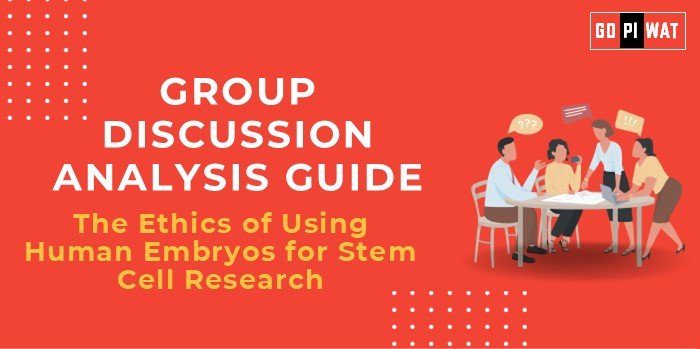📋 Group Discussion (GD) Analysis Guide: The Ethics of Using Human Embryos for Stem Cell Research
🌐 Introduction to the Topic
Opening Context: Stem cell research holds tremendous promise for treating debilitating diseases such as Parkinson’s, diabetes, and spinal cord injuries. However, the ethical dilemma surrounding the use of human embryos for harvesting stem cells has sparked debates worldwide, balancing scientific progress against moral and societal values.
Topic Background: The controversy dates back to the late 1990s when scientists discovered the potential of pluripotent stem cells derived from embryos. While this research could revolutionize medicine, it raises questions about the sanctity of human life and the moral status of embryos. This debate continues to shape public policies and research frameworks globally.
📊 Quick Facts and Key Statistics
- 💰 Stem Cell Funding: Global stem cell market valued at $20.4 billion in 2023.
- 📈 Success Rates: Over 100 clinical trials using stem cells are underway globally.
- ⚖️ Policy Variance: Countries like the UK and Israel allow embryonic research under strict guidelines, while others like Germany ban it outright.
- 🧠 Moral Debate: 48% of Americans support embryonic stem cell research, with 25% opposed (Pew Research, 2023).
🤝 Stakeholders and Their Roles
- 🔬 Scientists and Researchers: Advocate for access to embryos to advance medical science.
- 🏛️ Governments and Policy Makers: Regulate research to balance innovation with ethical standards.
- ✝️ Religious Organizations: Often oppose the use of embryos, citing moral concerns.
- 👥 Patients and Advocacy Groups: Strong supporters due to the potential life-saving outcomes.
🏆 Achievements and Challenges
✨ Achievements
- 💡 Breakthrough Treatments: Successful application of stem cells in treating blood disorders and eye diseases.
- 🧪 Scientific Progress: Development of induced pluripotent stem cells (iPSCs) to mitigate ethical concerns.
- 📜 Policy Frameworks: Effective regulations in countries like the UK enable responsible research.
⚠️ Challenges
- ⚖️ Ethical Concerns: Debate over the moral status of embryos.
- 🌍 Policy Disparity: Lack of uniform global regulation hampers collaborative research.
- 🤔 Alternative Methods: Questions on the effectiveness of non-embryonic sources like iPSCs.
🌍 Global Comparisons
Success: The UK’s Human Fertilisation and Embryology Authority ensures ethical research.
Challenges: Germany’s restrictive laws highlight the tension between ethics and science.
📚 Case Study
California’s Stem Cell Agency (CIRM): Demonstrates how state-level funding can drive progress while addressing ethical concerns.
📄 Structured Arguments for Discussion
- ✅ Supporting Stance: “Embryonic stem cell research is crucial for scientific progress and saving lives.”
- ❌ Opposing Stance: “Destroying embryos for research undermines the sanctity of life.”
- ⚖️ Balanced Perspective: “Research should progress, but only within stringent ethical frameworks.”
🎯 Effective Discussion Approaches
- Opening Approaches:
- 📊 “In 2023, stem cell therapies gave sight to over 100 patients—yet the ethical debate remains unresolved.”
- 🤔 “Are embryos the key to curing chronic diseases, or are we overstepping moral boundaries?”
- Counter-Argument Handling:
- 🛠️ Acknowledge emotional opposition while presenting scientific outcomes.
- 📚 Highlight advances in iPSCs as a potential compromise.
📊 Strategic Analysis of Strengths and Weaknesses
- 💪 Strengths: Potential for life-saving cures, technological innovation.
- 📉 Weaknesses: Ethical opposition, policy disparities.
- 🚀 Opportunities: Alternative stem cell sources, international collaboration.
- ⚡ Threats: Political backlash, loss of public trust.
📈 Connecting with B-School Applications
- 🌐 Real-World Applications: Healthcare innovation strategies, bioethics policymaking.
- 🗣️ Sample Interview Questions:
- 💬 “Should ethical boundaries limit scientific progress?”
- ⚖️ “How can businesses navigate controversial technologies?”
- 🎓 Insights for B-School Students: Explore bioethics, develop healthcare business strategies, and engage in stakeholder management.


